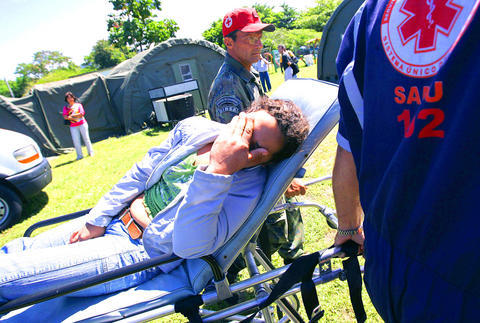Brazil's government deployed the army in Rio de Janeiro on Monday to fight an outbreak of dengue fever amid squabbling between politicians over who should handle an epidemic that has sickened more than 45,000 people this year.
State officials said three new military field hospitals set up in Rio de Janeiro should help ease the shortage of hospital beds and take some of the pressure off emergency rooms packed with victims of the mosquito-borne disease.
"We have to enter into combat like we're fighting a war, to minimize the suffering of the population," field hospital commander Major Roberto Tury said.

PHOTO: AP
Rio de Janeiro state, home to 16 million people, has seen more than 45,000 cases of dengue since January, compared to 25,107 cases in all of last year, officials say. Fifty-four people have died in the state this year, while more than 60 reported deaths are under investigation.
But as the proportions of epidemic became evident in the middle of last month, federal Health Minister Jose Gomes Temporao singled out Rio's municipal authorities for blame, pointing out that dengue cases were down 40 percent across Brazil, while the number of cases in Rio had exploded.
He said city officials failed to heed warnings in November about an impending epidemic and failed to spray against the mosquitos early.
Rio Mayor Cesar Maia, who is a leading member of the opposition DEM party, refused to acknowledge there was an epidemic until only recently and blamed the federal government for not warning the city in time to fight the disease.
At the same press conference he announced his party would launch its own candidate for president rather than supporting a coalition candidate as they had in the past.
On Monday night, Brazilian President Luiz Inacio Lula da Silva said officials at all levels -- including himself -- are to blame for mishandling the problem.
"It's the responsibility of the president, the governor, the mayor and each resident of this country," Lula said. "If we don't clean up the water in our home, our street, our city, our state, we will all be victims of irresponsibility."
Dengue causes high fevers, severe headaches and joint pains but is not usually fatal. More than half the fatalities have been children under 13 years of age, state health authorities said. Statistics on nationwide deaths were not available.
Brazil had more than half of the 900,782 cases of dengue in the Americas last year, the Pan American Health Organization figures showed. Of the hemisphere's 317 deaths, 158 came in Brazil, including 31 in Rio state.

In the sweltering streets of Jakarta, buskers carry towering, hollow puppets and pass around a bucket for donations. Now, they fear becoming outlaws. City authorities said they would crack down on use of the sacred ondel-ondel puppets, which can stand as tall as a truck, and they are drafting legislation to remove what they view as a street nuisance. Performances featuring the puppets — originally used by Jakarta’s Betawi people to ward off evil spirits — would be allowed only at set events. The ban could leave many ondel-ondel buskers in Jakarta jobless. “I am confused and anxious. I fear getting raided or even

Kemal Ozdemir looked up at the bare peaks of Mount Cilo in Turkey’s Kurdish majority southeast. “There were glaciers 10 years ago,” he recalled under a cloudless sky. A mountain guide for 15 years, Ozdemir then turned toward the torrent carrying dozens of blocks of ice below a slope covered with grass and rocks — a sign of glacier loss being exacerbated by global warming. “You can see that there are quite a few pieces of glacier in the water right now ... the reason why the waterfalls flow lushly actually shows us how fast the ice is melting,” he said.

Eleven people, including a former minister, were arrested in Serbia on Friday over a train station disaster in which 16 people died. The concrete canopy of the newly renovated station in the northern city of Novi Sad collapsed on Nov. 1, 2024 in a disaster widely blamed on corruption and poor oversight. It sparked a wave of student-led protests and led to the resignation of then-Serbian prime minister Milos Vucevic and the fall of his government. The public prosecutor’s office in Novi Sad opened an investigation into the accident and deaths. In February, the public prosecutor’s office for organized crime opened another probe into

RISING RACISM: A Japanese group called on China to assure safety in the country, while the Chinese embassy in Tokyo urged action against a ‘surge in xenophobia’ A Japanese woman living in China was attacked and injured by a man in a subway station in Suzhou, China, Japanese media said, hours after two Chinese men were seriously injured in violence in Tokyo. The attacks on Thursday raised concern about xenophobic sentiment in China and Japan that have been blamed for assaults in both countries. It was the third attack involving Japanese living in China since last year. In the two previous cases in China, Chinese authorities have insisted they were isolated incidents. Japanese broadcaster NHK did not identify the woman injured in Suzhou by name, but, citing the Japanese